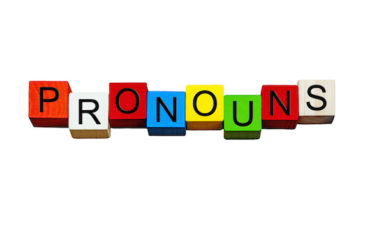
UPDATED
Visiting scholar objects: ‘I would not feel fully included’ under ‘official morality’ policy
American University’s Center for Diversity and Inclusion would like to require faculty to address students by their “chosen name and pronouns,” so as to make transgender, genderqueer and gender non-conforming students feel welcome.
A visiting scholar who just left AU’s Department of Management is so concerned about the proposal that he’s trying to nix it from the top.
Adam Kissel, who formerly served in the Trump administration’s Department of Education, learned about the proposal after asking the center about a “pronoun guide” on the private university’s website (below).
In a Wednesday letter to President Sylvia Burwell that he shared with The College Fix, Kissel expressed concerns about mandatory compliance with the pronoun guide.
“Not only would such a policy be exclusive with respect to people who have moral views that differ from those of the official morality of AU and its Center for Diversity & Inclusion, and not only would such a policy enforce a set of alleged facts that are deeply contested in American society and among scholars,” he wrote, but this policy would also “violate AU’s promises of academic freedom and free speech.”
The university does not have an explicit policy of punishing community members who use pronouns incorrectly, but they can be investigated for failure to respect gender identity through its bias reporting system.
Two American University officials, Associate Dean of Students Michelle Espinosa and Assistant Dean of Students Jaris Williams, told The Fix to inquire about the recent developments with Dean of Students Jeffrey Brown. He did not respond to requests for comment via phone or email.
MORE: AU investigates student for challenging its ‘censorial’ climate

Asking for someone’s pronouns is ‘basic to human dignity’
The university’s pronoun guide, which is at least four years old, instructs community members on how to ask for and use pronouns.
It explains the pronunciation and conjugations of “Ze,” “Ey” “Per” and “Them” among other pronouns, and advises readers to “never argue with or question a person’s gender identity of pronouns.”
The guide also addresses misconceptions surrounding gender identity. It warns the community not to assume that “she/her/hers” are female pronouns, or that “he/him/his” are male.
There is also a proper decorum to observe when inquiring about someone’s pronouns. “Many people find the use of ‘preferred’ to describe names and pronouns insulting,” the guide instructs. “It is not someone’s ‘preferred’ pronouns, but the pronouns that they use.”
But Kissel didn’t know the guide existed before someone sent it to him last month, he told The Fix. He shared his correspondence with various university officials.
The issue has personal relevance to Kissel because he worked on academic freedom and conscience issues at the Foundation for Individual Rights in Education earlier in his career. He currently manages programs on civic and higher education at the Philanthropy Roundtable.
MORE: AU students wising up to mandatory diversity class
“Is this just an optional and voluntary set of ideas from your one office, or is it more official than that?” he wrote in a July 20 email to the Center for Diversity and Inclusion. Robin Adams, the center’s director of educational programs and training, told him there was “no mandatory campus policy that dictates you must use non-binary pronouns.”
But she emphasized that it was out of line with both campus practice and values to not use pronouns as others use them.
The practice of “asking, sharing, and respecting personal pronouns is commonplace on our campus,” it’s in line with the university’s Inclusive Excellence Plan, and it’s “basic to human dignity,” Adams wrote.
In an email to The Fix, Adams reiterated much of what she told Kissel. But she emphasized that there were “no punitive measures that any member of the American University community will receive if they fail to uphold the guide’s recommendations.”
Six days after Adams’ response, Kissel received a response from Anna Morrison, coordinator for LGBTQ+ support and diversity programs. It convinced Kissel he should intervene at the top, he told The Fix.
While the guide is “just best-practice” for the moment, “we are currently working on a chosen-name policy for the university and I would like to make this official policy to use [a] student’s chosen name and pronouns,” Morrison wrote.
Academic freedom commitment leaves no ‘opening for a mandatory speech policy’
Morrison apparently thought better of putting the nascent policy change in writing, because she sent “recall” messages “to unsend the email” after Kissel received it, he told President Burwell in an email last week (below).
The diversity coordinator’s right to advocate for policy change at AU “becomes tricky in the context of statements in [Morrison’s] official administrative role,” Kissel added. (He showed The Fix a recall message from Morrison’s email account, which reads in full “Anna Morrison would like to recall the message, ‘pronoun guide’.” Kissel said he actually received two such messages with the same timestamp.)
Like Kissel, who served as deputy assistant secretary for higher education programs, Burwell is also a former high-level federal official. She served as secretary of health and human services in the Obama administration.
Reprising his role analyzing academic policies at FIRE, Kissel explained to Burwell why a mandatory pronoun and name policy was out of step with American University’s other commitments.
The university’s endorsement of a 1940 statement by the American Association of University Professors, which lays out the boundaries of academic freedom, would seem to conflict with the proposal by Morrison.
Some at the university may “incorrectly see … an opening for a mandatory speech policy” because the AAUP statement makes an exception for speech that “violate[s] University policies,” Kissel wrote. But AU cannot both adhere to the AAUP statement and “require compliance with strict moral positions” such as mandatory adherence to chosen name and pronouns.
MORE: AU to spend $121 million on diversity – maybe more in 2 years

Kissel also quibbled with the pronoun guide itself, because it “promotes an official morality and alleges facts that are deeply contested.” He cited a recent public letter, issued by a dozen academic philosophers from around the world, that opposes limits on the academic debate of gender identity.
The pronoun guide “seems to fail the test of diversity, equity, and inclusion by seeming to exclude those who have different views of the alleged morals and facts,” he said. “Were I to return to AU” as a visiting scholar, “I would not feel fully included” under an AU policy that promotes “an official AU morality.”
It’s not just the pronoun guide that makes some feel like “second-class members” of the community, Kissel continued. He cited a Wednesday email that “clearly states that the United States of America is out of step with American University’s morality,” and invited Burwell to discuss the issues further.
Provost Daniel Myers and Fanta Aw, vice president of campus life and inclusive excellence, wrote to community members to make them aware that the fall recruiting season was starting, and the U.S. military would be on campus.
The email concerns a federal mandate prohibiting transgender people from serving in the U.S. military, known as Directive-type Memorandum-19-004.
This policy “conflicts with AU’s values and our policies prohibiting discrimination,” but the university would risk both federal student aid and institutional research grants if it banned military recruiting, a violation of federal law, Myers and Aw said. The officials simply wanted to “educate the community about AU’s values and policies.”
MORE: AU blocks whites from cafe designated ‘sanctuary’ for nonwhites
No ‘punitive measures’ – but bias investigation could chill speech
While Adams told The Fix there were no “punitive measures” for not following the pronoun guide, American University explicitly tells the community it may take measures to combat bias on the basis of gender identity.
Failure to use a person’s chosen name or pronouns may qualify as “bias” under university policy. The term is defined as “the personal, unreasoned judgment or attitude that inclines an individual to treat someone negatively because of their real or perceived” gender identity, among other characteristics.
Bias-related acts include “degrading language,” “name calling” and “stereotypes,” which could be construed from refusal to address a person by chosen name or pronouns.
Bias reports go through a series of administrative processes. If the conduct in question is not deemed to be a policy violation, the accused person is confronted with an “educational conversation” or another form of “appropriate intervention.”
Such interventions have been faulted as an impermissible chilling of speech in an academic context, particularly when bias response teams include law enforcement, as does the University of Illinois’s team.
Two years ago, a faculty task force at the University of Oregon warned that its bias team could infringe on academic freedom and intellectual diversity. It cited the team’s meeting with the student newspaper to discuss a complaint about its insufficient coverage of transgender issues.
A supposedly educational visit “may itself be seen as a form of coercion and an attempt to influence editorial policy,” the task force concluded.
UPDATE: Kissel showed The Fix the recall message from Morrison after this article was published. It has been incorporated.
MORE: U. Oregon faculty object to bias investigations as speech-chilling
IMAGE: Ed Samuel/Shutterstock





Please join the conversation about our stories on Facebook, Twitter, Instagram, Reddit, MeWe, Rumble, Gab, Minds and Gettr.